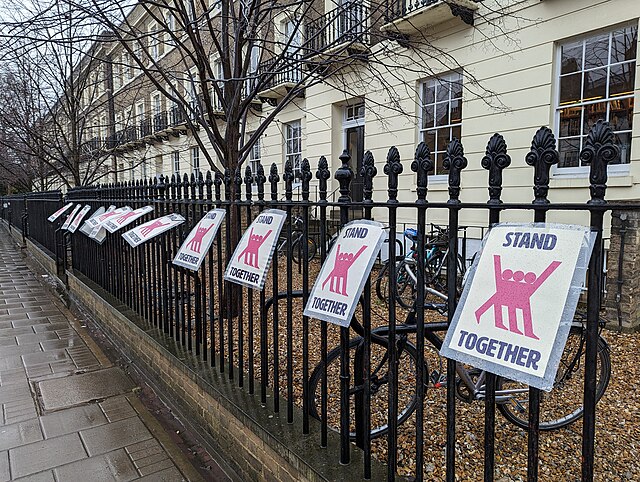
By Tony Dobbins, Professor of Work and Employment Relations Department of Management
The right to strike or withdraw labour is a fundamental human right in a democratic free society, but is now challenging in the UK due to anti trade union laws enacted in recent decades, including a new Strikes (Minimum Service Levels) Bill 2023. The Trades Union Congress (TUC) recently reported the UK government to the International Labour Organisation (ILO), which has requested conformance with international labour standards.
Nonetheless, there has been a wave of strikes in the UK in the past year, mainly in public services, privatised utilities and transport operators. 2.472 million working days were lost to industrial action between June and December 2022. However, it is important to place this in historical context – this compares with the highest recorded number of 11.716 million working days lost in (one month) September 1979.
The cost-of-living crisis, or more accurately a crisis of everyday liveability, was a spark that ignited industrial action in 2022/2023. Inflation reached a 40 year high of 11.1% in October 2022, and was 8.7% in May 2023. According to Calafati and colleagues, the cost-of-living crisis has been superimposed onto the crumbling of three pillars of everyday liveability: disposable and residual income, foundational services and social infrastructure.
Corporate profiteering
The governor of the Bank of England, Andrew Bailey, has blamed inflation on workers’ pay demands. However, there is a growing body of opinion that it is mainly a profit-price rise spiral caused by corporate profiteering, and issues like Brexit and the Ukraine conflict. Even the International Monetary Fund (IMF), not commonly viewed as pro worker, concludes that rising corporate profits account for almost half the increase in Europe’s inflation over the past two years as companies increased prices.
Wage squeeze
Meanwhile, real-terms pay (adjusted for inflation) has dropped steeply, especially in the public sector. According to the FT’s Martin Wolf, since the Conservative Party won power in 2010, real average pay has risen by 5.5 per cent in the private sector, but declined by 5.9 per cent in the public sector. According to the Institute for Fiscal Studies, real average earnings are the same today as in 2007. Such a wage squeeze has not happened over any comparable period since the Napoleonic wars.
The bigger picture is that the current UK strike wave is symptomatic of the damage caused by austerity, a crisis of underinvestment, and extreme inequalities in distribution of wealth (and the share of profits relative to wages).
A study by the Progressive Economics Forum (PEF) reveals that the economic damage inflicted by austerity is significantly higher than previously thought, needlessly cutting more than half a trillion pounds from public expenditure. Another study by the Institute for Public Policy Research (IPPR) on investment phobia in the UK, suggests that both public and business investment are near the bottom of the league among OECD countries. This investment phobia exists in a highly unequal country. According to The Equality Trust, by 2023, the richest 50 families in the UK held more wealth than half of the UK population, comprising 33.5 million people.
This public investment crisis in a country with extreme wealth inequalities contributes to outcomes like strikes and conflict, serious staff recruitment and retention deficits in professions like healthcare and teaching, and a growing general perception that nothing works (note, for example, the controversies over profiteering in privatised rail and water companies).
Such structural causes of strikes are often not analysed by mainstream commentary, which tends to focus on the disruption. This is exacerbated by the lack of specialist industry and employment reporters in the media with knowledge of industrial relations.
Intransigent industrial relations
The reality is that unions often feel forced to strike as a last resort to defend their members’ jobs and living standards, and public services, when attempts at dialogue have failed or do not even occur. For example, the Royal College of Nurses undertook the first nationwide strikes in its 106-year history in 2022/23.
Government and many employers adopt an increasingly intransigent approach to industrial relations, and/or maybe they don’t know how to do industrial relations and bargained compromise. More use could be made of the expertise of the dispute resolution agency Acas to intervene in intractable disputes. The government have also indicated that they may disregard public sector pay review body recommendations. In contrast, the devolved governments in Scotland and Wales have shown more readiness to agree deals.
Another notable aspect is that professionals like public service workers may be frustrated in simply trying to do their job if, for example, funding is cut, workload is intensified, work is chaotic, and there are staffing shortages.
All strikes eventually end, ideally through bargained compromise. But the bigger picture cause of conflict resides in structural problems facing the UK’s neo-liberal political economy. In comparison, other European countries adopt a more cooperative and proactive approach to industrial relations, as our research shows.
The views and opinions expressed in this article are those of the author and do not necessarily reflect the official policy or position of the University of Birmingham.
